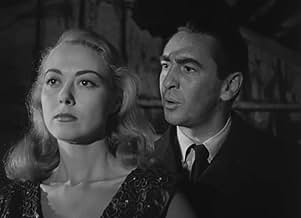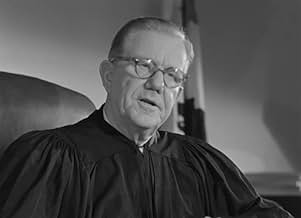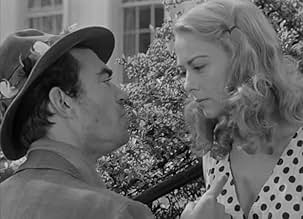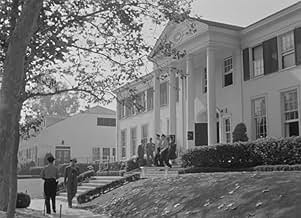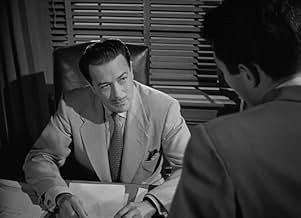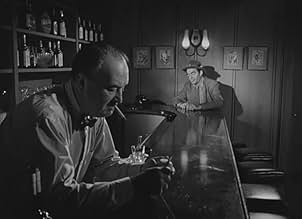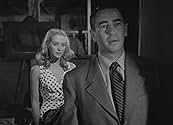Lawyer defends migrant worker falsely accused of two murders.Lawyer defends migrant worker falsely accused of two murders.Lawyer defends migrant worker falsely accused of two murders.
Frank Baker
- Court Stenographer
- (uncredited)
Marshall Bradford
- Coroner
- (uncredited)
Ralph Brooks
- Courtroom Photographer
- (uncredited)
Benny Burt
- Citizen
- (uncredited)
Jack Carr
- Angry Citizen
- (uncredited)
Robert Carson
- Jury Foreman
- (uncredited)
Ralph Dumke
- Bartender
- (uncredited)
Richard Emory
- Reporter
- (uncredited)
Featured reviews
Despite the economical running time, very much more of this unexceptional movie may well have felt like counting the hours as the finale approached.
Opening as a spine tingling creepshow, rapidly followed by gunfire and a double murder, 'Count the Hours' soon settles upon a pedestrian plateau as John Craven desperately pleads innocent of any crime, his case seriously damaged when panic stricken wife, Teresa Wright disposes of his gun in a nearby lake. The ensuing, protracted courtroom scene does little to reignite the adrenaline levels.
Sceptical, inexperienced lawyer, MacDonald Carey, is initially unwilling to take the case, until he spots Wright risking life and limb, repeatedly diving as she attempts to retrieve the gun. Carey is also confronted by the prevailing small town ethos (even evident amongst all the fun and games of My Cousin Vinny) in which everybody knows everybody else and nobody knows anybody who would ever do anything to hurt anyone.....Does that make sense? Therefore, Craven and Wright tick all the boxes as drifters, out- of- towners, new kids on the block, who simply MUST be guilty!
It's all rapidly rolling into the realms of rigmarole, until a much needed shot in the arm arrives in the form of loopy local loony, Jack Elam and his kooky, money grabbing, gold digging moll, Adele Mara. A femme fatale failure, whose feminine wiles fall foul of the unpredictable Elam and the reputable Carey.
'Count the Hours' has its moments, it's worth the time, but hardly the film noir fireball it promises to be at the start. Elam and Mara largely steal the show, well supported by the endearingly sincere, guilt ridden Wright. In contrast, neither Carey nor Craven radiate any significant on screen charisma, while Dolores Moran is serviceable as the bride to be. The movie always struggles to maintain momentum following its Wham-Bam-Thankyou-Mam launch. Perhaps it's just a bit too obvious, right down to Elam's name in the opening credits. Could you REALLY imagine him as a doting, favourite uncle, or the kindly family doctor?
Opening as a spine tingling creepshow, rapidly followed by gunfire and a double murder, 'Count the Hours' soon settles upon a pedestrian plateau as John Craven desperately pleads innocent of any crime, his case seriously damaged when panic stricken wife, Teresa Wright disposes of his gun in a nearby lake. The ensuing, protracted courtroom scene does little to reignite the adrenaline levels.
Sceptical, inexperienced lawyer, MacDonald Carey, is initially unwilling to take the case, until he spots Wright risking life and limb, repeatedly diving as she attempts to retrieve the gun. Carey is also confronted by the prevailing small town ethos (even evident amongst all the fun and games of My Cousin Vinny) in which everybody knows everybody else and nobody knows anybody who would ever do anything to hurt anyone.....Does that make sense? Therefore, Craven and Wright tick all the boxes as drifters, out- of- towners, new kids on the block, who simply MUST be guilty!
It's all rapidly rolling into the realms of rigmarole, until a much needed shot in the arm arrives in the form of loopy local loony, Jack Elam and his kooky, money grabbing, gold digging moll, Adele Mara. A femme fatale failure, whose feminine wiles fall foul of the unpredictable Elam and the reputable Carey.
'Count the Hours' has its moments, it's worth the time, but hardly the film noir fireball it promises to be at the start. Elam and Mara largely steal the show, well supported by the endearingly sincere, guilt ridden Wright. In contrast, neither Carey nor Craven radiate any significant on screen charisma, while Dolores Moran is serviceable as the bride to be. The movie always struggles to maintain momentum following its Wham-Bam-Thankyou-Mam launch. Perhaps it's just a bit too obvious, right down to Elam's name in the opening credits. Could you REALLY imagine him as a doting, favourite uncle, or the kindly family doctor?
MacDonald Carey and Teresa Wright, both of whom starred in Hitchcock's Shadow of a Doubt, work together again in a less prestigious film, "Count the Hours" from 1953, directed by Don Siegel.
Wright is Ellen Braden, whose husband George (John Craven), a migrant worker, is arrested for the murder of an elderly man and his housekeeper that was done apparently during a robbery - the man kept a lot of money in his house.
When asked if he has a gun, he at first says no. His wife runs home and throws the gun in the lake, but she's seen doing it. By then he's admitted to having one. He's believed to be guilty.
Carey plays attorney Doug Madison, who is asked to take the case but refuses. After speaking with Mrs. Braden, he changes his mind. He's convinced that they have to find the gun. But when they do, it's a disappointment. Doug believes in George's innocence, which means they have to find the killer.
Pretty good mystery-suspense film which also features Jack Elam. Wright is sympathetic as the pregnant Ellen who believes in her husband, but John Craven doesn't register much.
Carey was an affable leading man who found his great success on Days of Our Lives. He had a wonderful speaking voice and a gentle presence. Elam is his usual evil-looking and sleazy self.
On the ordinary side but tense nonetheless.
Wright is Ellen Braden, whose husband George (John Craven), a migrant worker, is arrested for the murder of an elderly man and his housekeeper that was done apparently during a robbery - the man kept a lot of money in his house.
When asked if he has a gun, he at first says no. His wife runs home and throws the gun in the lake, but she's seen doing it. By then he's admitted to having one. He's believed to be guilty.
Carey plays attorney Doug Madison, who is asked to take the case but refuses. After speaking with Mrs. Braden, he changes his mind. He's convinced that they have to find the gun. But when they do, it's a disappointment. Doug believes in George's innocence, which means they have to find the killer.
Pretty good mystery-suspense film which also features Jack Elam. Wright is sympathetic as the pregnant Ellen who believes in her husband, but John Craven doesn't register much.
Carey was an affable leading man who found his great success on Days of Our Lives. He had a wonderful speaking voice and a gentle presence. Elam is his usual evil-looking and sleazy self.
On the ordinary side but tense nonetheless.
The great director who would make " invasion of the body snatchers" "the killers" "the beguiled" and even Elvis' best ("flaming star") is already present;his flair for film noir and for disturbing atmosphere is glaring in the scene in which the diver tries to rape T. Wright:the way Siegel films his eyes is absolutely terrifying ;ditto for the scenes when the lawyer looks for the former employee;oddly Siegel does not seem to very interested in T.Wright's character and the last scenes are given over to Dolores Moran and Adele Mara,who are relatively obscured thespians compared to the star of "shadow a doubt" and Wyler's war movies.
However,the movie is absorbing and a must for suspense buffs.
Like this ?try these
"phantom lady" (Robert Siodmak,1944)
"time without pity" (Joseph Losey ,1956)
"they won't forget " (Mervyn LeRoy,1937)
However,the movie is absorbing and a must for suspense buffs.
Like this ?try these
"phantom lady" (Robert Siodmak,1944)
"time without pity" (Joseph Losey ,1956)
"they won't forget " (Mervyn LeRoy,1937)
This is far from the best Don Siegel movie. But, despite flaws in writing and acting, it's gripping and moves along, keeping the viewer on the edge of his or her seat.
Nothing is really credible. Theresa Wright as an itinerant farmer's wife? Actors with pronounced New York accents as menacing rednecks? And something about the script seems truly sub-par. The dialogue is not grammatical and this is not a matter of simulating regional speech or signifying class. The dialogue is just not well written.
The music, too, is strangely self-contradictory. At first it is pure schmalz, and Don Siegel is not the man for romance, even if it's romantic noir. Then a theramon is introduced and it sounds better.
Despite quibbling on my part, it's an engrossing movie. Believable? Not exactly. But, if one cuts it some considerable slack, it works well as a suspenseful kind-of noir.
Nothing is really credible. Theresa Wright as an itinerant farmer's wife? Actors with pronounced New York accents as menacing rednecks? And something about the script seems truly sub-par. The dialogue is not grammatical and this is not a matter of simulating regional speech or signifying class. The dialogue is just not well written.
The music, too, is strangely self-contradictory. At first it is pure schmalz, and Don Siegel is not the man for romance, even if it's romantic noir. Then a theramon is introduced and it sounds better.
Despite quibbling on my part, it's an engrossing movie. Believable? Not exactly. But, if one cuts it some considerable slack, it works well as a suspenseful kind-of noir.
A robber breaks into a farm house. He is confronted by the owner and ends up killing the elderly couple. George Braden and his wife Ellen (Teresa Wright) are the neighbors. After some questionable responses, George is arrested for the murders. Doug Madison (Macdonald Carey) takes the case despite not believing in George's innocence.
At first, I thought some of this plot goes too far. I don't want to nitpick but I can't believe that they couldn't find the gun. Everybody knows where she threw it. It's not a raging river. Then I relaxed about it and realized that it's more about the acting style. The movie is doing that old melodramatic style. Teresa Wright is a great actress, but she's using her skills to do her utmost overwrought acting. I actually grew to like the plot especially if they could tweak some of it. I can see it be remade into something better.
At first, I thought some of this plot goes too far. I don't want to nitpick but I can't believe that they couldn't find the gun. Everybody knows where she threw it. It's not a raging river. Then I relaxed about it and realized that it's more about the acting style. The movie is doing that old melodramatic style. Teresa Wright is a great actress, but she's using her skills to do her utmost overwrought acting. I actually grew to like the plot especially if they could tweak some of it. I can see it be remade into something better.
Did you know
- TriviaAfter Director of Photography John Alton agreed to shoot this movie, he asked Producer Benedict Bogeaus how much he had budgeted for rigging - the system of overhead pipes, brackets, ropes, and cables that suspend lights over a film set. Bogeaus told him four thousand dollars. "Give me two thousand dollars above my salary and I won't use any rigging," said Alton. He did it by using almost no overhead lighting at all, contributing to the film's rich visual atmosphere.
- GoofsThe screen shows a newspaper article stating that George Braden is about to go on trial for the murder of Fred Morgan. However, two people were killed, so both names should have been given.
- ConnectionsReferenced in Mau Mau Sex Sex (2001)
Details
- Runtime1 hour 16 minutes
- Color
- Aspect ratio
- 1.37 : 1
Contribute to this page
Suggest an edit or add missing content


